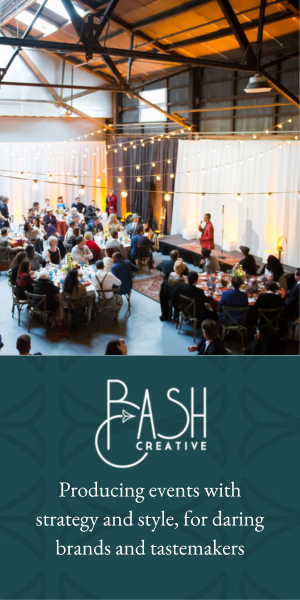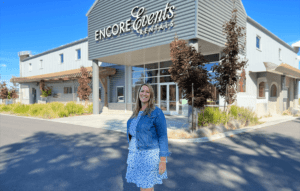Andrew Everingham is the Founder and CEO of Capital-e, a marketing and events company based in Sydney, Australia. With thirteen years in business, the company has formed a thriving and inspiring team that works with world-class tech innovators. In this interview for Follow the Founder, Andrew talks about what aided this success and shares some advice for aspiring and new Founders.
Reflecting on the beginning of his journey, Andrew draws from his experience thinking about how he would go about getting started with a business if he had to do it again today, who would he talk to, and what truly proved to be important.
“When I started the business, I was quintessentially that person with the great idea who didn’t know anything about how to run a business. So I would start with a bunch of things.
“Firstly, go out and seek help from people who are already doing something similar. People spend a lot of time working with or investigating competitors and understanding from the outside what they appear to be like. Quite often, people are trying to create something that isn’t what their competitors are doing, something to give them differentiation and enable them to be successful. However, I think you’ve got to look at your competitors very closely and learn from them.
“I am very lucky because I like most of my competitors. I genuinely enjoy seeing them succeed, and I learned a lot from them. They are amazing providers of marketing services. I see when they do something great, and I celebrate and take it as a learning opportunity.”
Having good relationships with everyone including your competitors will be very beneficial for the business. Sometimes if you are fully booked, you might want to refer clients to someone who you know is going to do a good job. One day, this company would most likely return the favor. Together with your competitors, you are collectively taking care of the business at hand. Moreover, building relationships around the globe with people in your field will make doing business more fun.
“There’s plenty of times where we say, ‘Look, we’re not right for you. I’m not really sure who is, but we won’t take your money because we’re not going to give you that return on that investment that you absolutely need to be able to be successful.’ Or if we know who is good for them, we say, ‘Go to one of these guys’. Even though they are a competitor.
“I truly believe that comes back around you. So that’s the way we work.”
His final piece of advice is very important: plan.
“Finally, this is a weird one, but be aware of the technology, especially in this day and age. Be very conscious of your systems and how you can improve them. I’ve seen other professional services businesses lose their way quickly because they don’t have both the digital and physical processes in place to ensure they’re able to sustain any level of growth. At the beginning it’s all growth, right? So that is really important.”
We all start a company intending for it to grow and develop. Yet, if that time comes, many Founders are almost blindsided by it. One of the biggest reasons for new businesses to fail is growing too fast [1]. To overcome this potential hurdle, new Founders need to have a plan for procedures in place if rapid scalability occurs. Acting as if you’re a big business from day one will bypass future issues, even if it’s something simple such as avoiding badly organized tax files or accounting documents. No matter how big or small, planning is essential.
“The need is at the beginning to start planning that going forward. If you don’t stay focused on the business of your business, it’s very easy for it to get very wobbly. I don’t mean necessarily because things are tough.
“I had one of my mentors say to me once I got the business up, ‘The most difficult time that you are going to face is growth.’ Not when things are tough. When things are tough, you get very pragmatic. When you are growing at a great rate is like being in a little red kart going down the hill that just keeps getting steeper and steeper, the wheels get wobblier and wobblier. This is when people come wildly off the rails.”
Planning for success and growth is more important than planning for failure. If bad times come, you make snap decisions. Also, it’s all dependent on the scenario. But once you have become successful, if you don’t have a great safe and trusting company culture, if you don’t have great people behind you, it will all fall apart.
Talking about company culture, Andrew has grown his company over the thirteen years in business. Successful growth is reliant on good self-awareness and the ability to acknowledge your strengths and weaknesses, the ability to be honest with yourself, and acknowledge you can’t do this alone. In his Founder story, Andrew shared his aha moment when he realized he cannot do everything alone. Many Founders, especially first-time Founders, feel like they have to do it all alone. Even if you trust yourself, it’s always beneficial to an extra external perspective.
“I think having trusted deep business advisors, whether that’s an accountant, whether it’s an outsourced CFO, or whether it’s a business mentor is critical.”
Surrounding yourself with the right people, immersing yourself in an environment that invigorates you and supports your growth as a Founder and an individual, is important. But also you have to stick to your vision and intuition and learn how to set good boundaries.
“You have to understand where your sweet spot is and where the boundaries are. What you shouldn’t do is agree with everyone. And I’m not saying this as an expert, but because I’m a helper. I want to help everybody that I work with and sometimes I’ll say yeah, we can do that we can help you out. And sometimes people ask me, ‘Is this really what you should be doing?’ So it’s all about surrounding yourself with people that can keep you accountable and be honest with you.”
“I think there’s something about starting things that differentiates Founders from thinkers. Even the word Founder comes from founding something, that is, laying the foundation stone. I love that as a visual. Yes, you can think all your life. But until you actually get the sandstone good on the ground, put your first building block, it’s just thinking. There’s nothing wrong with thinking if that’s what you want to do, but not if you want to create something.”
Being a visionary doesn’t necessarily imply that you can do all the work to drive a project from start to finish. Someone great at finishing something may not have the ability to be the dreamer or be the person who is to give the instruction. They might be wonderful at taking instruction and putting their twist on it and running with it, however. So, to talk about being a Founder and this journey that you have in starting a company is very much about self-awareness, but it is also about putting the right people in place.
Your peer group and environment is crucial for success. If you want to meet more people with similar aspirations, values, and ambitions, why not join our welcoming and growing community at Follow the Founder. You can also find us on Instagram or LinkedIn.
References:
[1] Why Growing a Businesses Too Fast Is Risky, Andrey Sokurec,
Want to Keep Reading?
The Human Network: Matthew O. Jackson
How our sometimes hidden positions in various social structures—our human networks—shape how we think and behave, and inform our very outlook on life.































